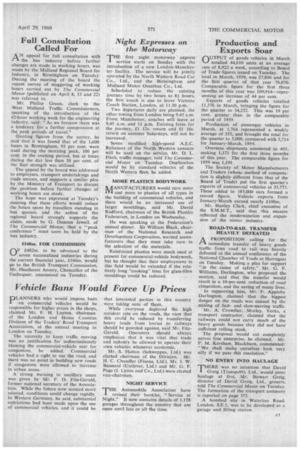Full Consultation Called For
Page 39

If you've noticed an error in this article please click here to report it so we can fix it.
AN appeal for full consultation with the bus industry before further changes are made in working hours, was made by the Midland Regional Board for Industry, in Birmingham on Tuesday. During the meeting of the board the recent survey of staggering of working hours carried out by The Commercial Motor (published on April 8, 15 and 22) was referred to.
Mr. Phillip Green, clerk to the West Midland Traffic Commissioners, speaking of the introduction of the 42-hour working week for the engineering industry, said: "As we foresaw there was a tendency for a further compression at the peak periods of travel."
Quoting figures from the survey, he said that it was found that of the 1,600 buses in Birmingham, 95 per cent, were used during the morning peak, 100 per cent, in the evening period, but at times during the day less than 30 per cent, of the fleet strength was utilized.
The appeal by the board was addressed to employers, transport undertakings and trade unions, and supports a similar plea by the Ministry of Transport to discuss the problem before further changes of working hours are made.
The hope was expressed at Tuesday's meeting that these efforts would reduce the hours spent by travellers standing in bus queues, and the action of the regional board strongly supports the claim, made by G. Duncan Jewell, of The Commercial Motor, that a "'peak conference" must soon be held by the bus industry.
£160m. FOR COMMISSION
OF £482m. to be advanced to the seven nationalized industries during the current financial year, £160m. would go to the British Transport Commission, Mr. Heathcoat Amory, Chancellor of the Exchequer, announced on Tuesday.
Night Expresses on the Motorway
THE first night motorway express service starts on Sunday with the introduction of a new London-Manchester facility. The service will be jointly operated by the North Western Road Car Co.. Ltd., and the Birmingham and Midland Motor Omnibus Co., Ltd.
Scheduled to reduce the existing journey time by two hours to 81 hours, the first coach is due to leave Victoria Coach Station, London, at 11.30 p.m.
Two departures daily are planned, the other timing from London being 9.45 a.m. From Manchester, coaches will leave at 9.45 a.m. and 11 p.m. Existing fares for the journey, £1 12s. return and £1 16s. return on summer Saturdays, will not be increased.
Seven modified high-speed A.E.C. Reliances of the North Western concern will be used on the service, Mr. D. L. Fitch, traffic manager, told The Commercial Motor on Tuesday. Duplication would be by standard vehicles of the North Western fleet, he added.
MORE PLASTICS BODYWORK AANUFACTURERS would turn more LIU and more to plastics of all types in the building of commercial vehicles, and there would be an increased use of larger mouldings, said Mr. David Radford, chairman of the British Plastics Federation, in London on Wednesday.
He was speaking at the Federation's annual dinner. Sir William Black, chairman of the National Research and Development Corporation, warned manufacturers that they must take care in the selection of the materials.
Reinforced plastics were much used at present for commercial-vehicle bodywork, but he thought that their employment in this field would be extended if the relatively long "cooking" time for glass-fibre mouldings could be reduced.












































































































